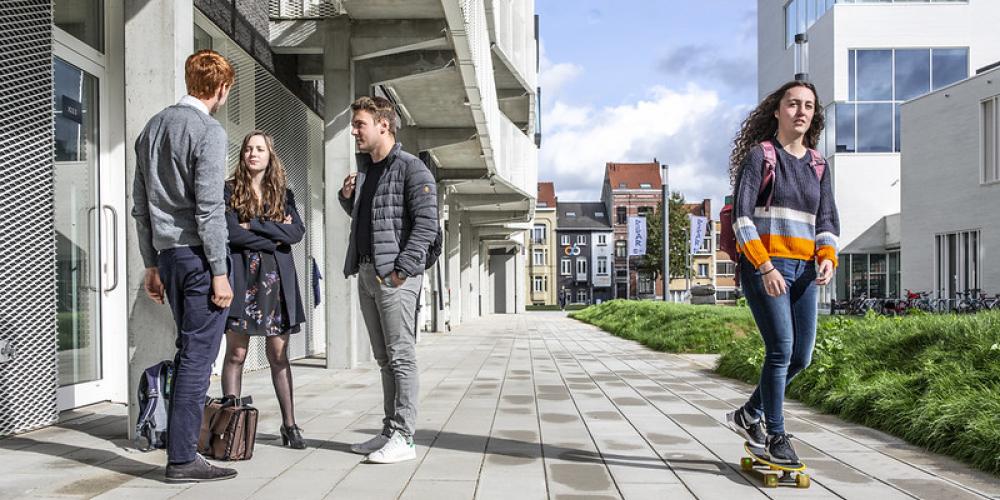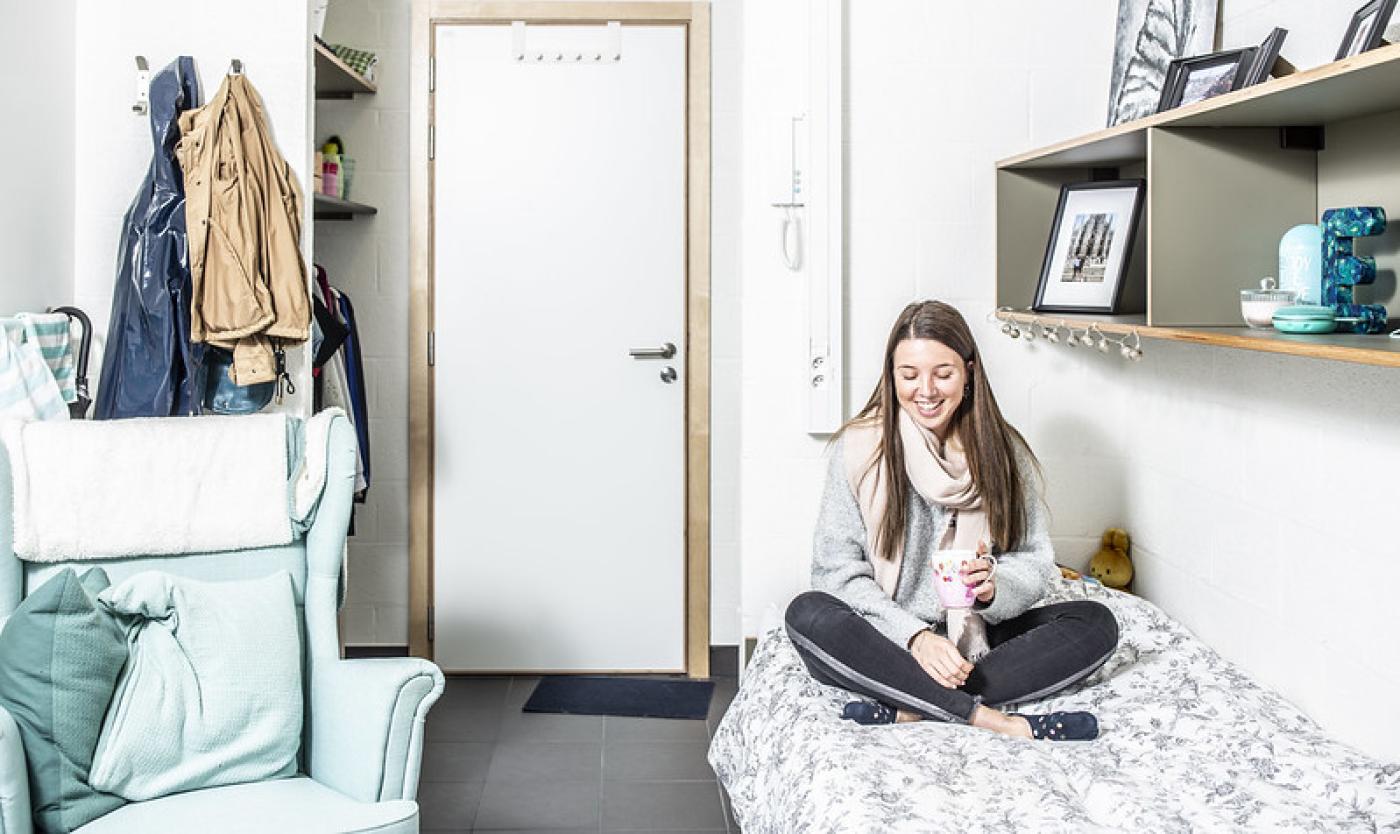
The Vrije Universiteit Brussel (VUB) offers 1,540 student rooms (referred to as "koten"), but this year, it received 5,000 applications. These numbers illustrate the student housing crisis in Brussels: demand is rising, and supply is failing to keep up. Bart Geelen, head of VUB’s student housing department, recognises that this problem won’t resolve itself. "The region, municipalities, developers, and educational institutions all need to step up," he says.
On Monday, 16 September, 800 new students will arrive at VUB student residences. They’ll be ready to embark on the most exciting years of their lives, having already secured one crucial thing: an affordable room near the university. Not everyone is so lucky. The demand for housing exceeds supply, as Geelen explains: "This year, we received 5,000 requests for a student room at VUB, but we only have 1,500 spots across five student residences: four around the VUB Main Campus and one at the Health Campus in Jette. By May, all 1,500 rooms were assigned, and the remaining applicants were placed on a waiting list. However, between May and September, nearly 500 of those students cancelled their reservations."

Bart Geelen
One in three students cancel. Why?
Bart Geelen: "The need is so great that people panic. They start searching early, applying to multiple cities like Ghent, Brussels, Leuven, or even in another European city. They often secure multiple reservations while waiting to make a final decision. Understandable, but this means highly sought-after spots are held unnecessarily."
Does this make your job harder?
"For our department, it's chaotic. Try contacting 500 students via email over the summer. It also impacts the composition of student units. Our colleague, Britt Vandesonneville, works hard to create a diverse but thoughtful mix of students, often placing peers from similar courses or cultural backgrounds together. With all these cancellations, it becomes more challenging each year."
Do some students get priority at VUB residences?
"Yes, first-generation students—those enrolling in higher education for the first time—are prioritised. Of the 800 new students in our residences, around 600 are first-generation students. They can stay for up to three years, the standard time to complete a bachelor’s degree. This helps them settle into university life and the city. After that, they need to find their own place."
What options do students have if they miss out on VUB accommodation?
"They can rent from Brik or look through MyKot, a database with 4,500 rooms. Brik manages and audits these, allowing students from VUB and four other Flemish higher education institutions to find quality-checked accommodation. About half of these rooms are in traditional houses rented out by local landlords; the other half are in larger residences owned by companies like Upkot, Student Diggit Life, and Xior. We agree on rules with these companies regarding rent, safety, and contracts."
The ‘Kotmadam’ Rooms Are Slowly Disappearing
MyKot fills up quickly.
"The best rooms go immediately. Many don't even make it to MyKot; they're rented out by word of mouth."
How do international students manage?
"Searching for accommodation from places like Iran, China, or Gambia is almost impossible. That’s why we allocate a larger proportion of our housing to international students. They make up 25% of the VUB student body, but they occupy 37% of our rooms. Another group that struggles is students in financial difficulty. Grant students can apply for a housing allowance of up to €160 per month from VUB. The region also subsidises 400 rooms at a reduced rate via the social rental office, but only 10% of those go to Dutch-speaking students."

Photo: Franky Verdickt
Why Is there so much pressure on the housing market?
"Student numbers are rising, but the market isn’t growing fast enough. The traditional 'kotmadam' rooms are disappearing, and developers can't fully compensate for that loss. Brussels has 115,000 students, with an estimated 45,000 living in the city. But there are only 20,000 to 25,000 student rooms available. The rest share apartments meant for families, and when they do that, they lose some of the rights they would have in official student housing. Plus, they’re pushing out local residents."
What’s the impact on prices?
"Prices are rising, partly because developers are focusing on building larger, more expensive studios. This is partly due to regional urban planning regulations. That’s why we’re asking the region to allow the construction of collective housing: smaller rooms with shared kitchens and bathrooms. (See box for more details.) A basic room like that could cost €400 to €450 per month, excluding bills."
What does the future look like?
"By 2030, we expect an additional 5,000 students will need accommodation. To ensure everyone has access to housing and to move those sharing family apartments into student rooms, we’ll need an estimated 30,000 new rooms."
Where will they be built?
"VUB plans to build two new student residences with 300 to 400 rooms near the campus. We’re looking at places like IJskelders, next to the Colruyt, and Usquare, the reconversion of the old police barracks. We hope these projects will be completed during this policy period. We’re also glad that municipalities like Auderghem and Ixelles are thinking about new projects, recognising that if students don’t have housing, they’ll take over residential property. They want to require developers to include student housing in new projects, in consultation with VUB and ULB. We fully support that."
Are there projects further away?
"There’s the Nijverheidskaai in Anderlecht, 40 minutes away, and new sites in Laken and Schaerbeek, around 30 minutes away. Ideally, these areas would have direct public transport links, allowing students to commute in less than half an hour."
Any tips for new student tenants?
"Don’t live in isolation. It’s not always easy, but it’s rewarding to get to know each other's cultures and habits. If you manage that, leave your residence and explore the rest of the city. Brussels is so much more than just that small area around Etterbeek."
Homework for the New Government
The formation of the new Brussels government is currently stalled. Jurgen Ral, director of Brik, the student housing organisation in Brussels, has some early homework for the negotiating parties. First on the list: map out the supply and demand for student housing.
Jurgen Ral, BRIK
Jurgen Ral: "The numbers Bart Geelen mentioned earlier are just estimates. No one knows exactly how many student rooms and students there are in Brussels. The regional service Perspective.Brussels is currently preparing a Student Housing Monitor, which we hope will be ready soon. Once we have a clear picture of supply and demand, we can assign new projects to developers more effectively."
In a manifesto for modern, high-quality, and affordable student housing, Brik and VUB, along with other Flemish higher education institutions, have called for a revision of regional urban planning regulations, which currently don’t mention student housing at all.
Jurgen Ral: "Developers who want to build small, collective student rooms—around 12 m² with shared kitchens and bathrooms—don’t have a regulatory framework to follow. So, it makes sense for them to opt for larger, 22 m² studios. These comply with current urban planning rules and are more profitable. As a result, the supply of more expensive housing is growing faster than the supply of affordable options."
In the previous government, secretaries Pascal Smet and Ans Persoons were working on reforming regional building permits. Brik had influenced this process through advice and objections, but the effort stalled just before the elections. Jurgen Ral hopes the new government will take up the issue again. "Don’t let all that work go to waste!"
This is a machine translation. Please excuse us for any possible errors.